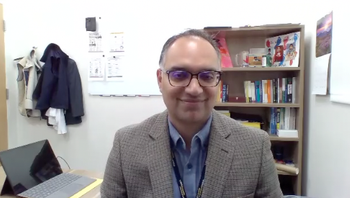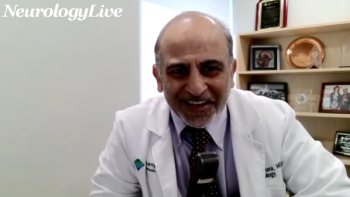
Neuromuscular
Latest News
Latest Videos

CME Content
More News

The vice chair of neurology at West Virginia University outlined key challenges in academic neurology and reflected on the evolving responsibilities of vice chairs in supporting departmental growth and leadership. [WATCH TIME: 3 minutes]

Avidity's del-zota shows promising results in reversing disease progression in Duchenne muscular dystrophy, paving the way for potential FDA approval.

Here's some of what is coming soon to NeurologyLive® this week.

New guidelines enhance gene therapy delivery for Duchenne muscular dystrophy, emphasizing multidisciplinary care and safety monitoring for optimal patient outcomes.

Take 5 minutes to catch up on NeurologyLive®'s highlights from the week ending September 12, 2025.

Saol Therapeutics faces challenges after FDA's complete response letter for SL1009, a potential treatment for rare mitochondrial disorder PDCD.

The chief medical adviser at the Muscular Dystrophy Association spoke about the specific safety considerations clinicians should take when prescribing and administering gene therapy for patients with Duchenne muscular dystrophy. [WATCH TIME: 3 minutes]

Catch up on any of the neurology news headlines you may have missed in August 2025, compiled into 1 place by the NeurologyLive® team.

New trial data reveal claseprubart shows significant efficacy in treating generalized myasthenia gravis, paving the way for potential FDA approval.

Here's some of what is coming soon to NeurologyLive® this week.

Test your neurology knowledge with NeurologyLive®'s weekly quiz series, featuring questions on a variety of clinical and historical neurology topics. This week's topic is on RNA therapeutics for neuromuscular disorders.

AL-S Pharma's AP-101 shows promising safety and efficacy in ALS patients, paving the way for future treatments targeting misfolded SOD1 proteins.

Take 5 minutes to catch up on NeurologyLive®'s highlights from the week ending September 5, 2025.

Mind Moments®, a podcast from NeurologyLive®, brings you an exclusive interview with Barry Byrne, MD, PhD. [LISTEN TIME: 15 minutes]

Here's some of what is coming soon to NeurologyLive® this week.

Neurology News Network. for the week ending August 30, 2025. [WATCH TIME: 4 minutes]

Take 5 minutes to catch up on NeurologyLive®'s highlights from the week ending August 29, 2025.

Long-term data confirms givinostat's safety and efficacy in delaying Duchenne muscular dystrophy progression, offering hope for patients and families.

Amylyx Pharmaceuticals discontinued its AMX0035 program for progressive supranuclear palsy after a phase 2b trial failed to show efficacy.

MediciNova's COMBAT-ALS trial reaches full enrollment, exploring ibudilast's potential to treat ALS and improve patient outcomes.

The neurophysiologist at Allegheny Health Network shared his clinical experience with tofersen in patients with SOD-1 ALS, while emphasizing the critical role of accessible genetic testing for patient identification. [WATCH TIME: 3 minutes]

Tracey Dawson, PhD, senior vice president of U.S. Therapeutic Area Head of Neuroscience at Novartis, expanded on the recently launched SMAshing My Limits campaign, a community-driven project aimed to address needs of developing teens with SMA.

The vice chair of education for the department of neurology at Mass General outlined her AUPN 2025 session on supporting clinician educators through recognition, career development, and institutional frameworks for advancement. [WATCH TIME: 4 minutes]

Serum NPTX2 emerges as a novel biomarker in ALS, with combined NPTX2 and NfL levels improving survival prediction and disease monitoring.

Regeneron's cemdisiran shows promising results in treating generalized myasthenia gravis, paving the way for a potential new drug application in 2026.















